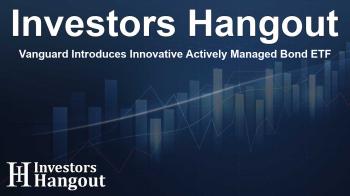Vanguard Introduces Innovative Actively Managed Bond ETF

Vanguard Introduces Actively Managed High-Yield Bond ETF
Vanguard has recently made a remarkable entry into the world of high-yield bonds with its latest offering, the Vanguard High-Yield Active ETF (VGHY). This innovative ETF is designed to cater to investors seeking income through professionally managed exposure to high-yield corporate bonds. Managed by the renowned Vanguard Fixed Income Group, VGHY reflects the company's long-standing commitment to disciplined credit investing.
The Importance of Active Management
Active management in the realm of high-yield bonds is essential for navigating the complex and often volatile market landscape. Vanguard's approach, highlighted by Michael Chang, the Head of High-Yield Portfolio Management, emphasizes the importance of a cohesive team of analysts, traders, and risk specialists. This collaborative effort aims to uncover value and mitigate risks effectively, providing a robust framework for investors.
Targeted Exposure and Flexibility
VGHY is strategically designed to offer diversified exposure across various high-yield credit quality ratings. This includes the flexibility to invest in complementary areas such as leveraged loans and U.S. investment-grade corporate bonds. Such diversification is vital for managing risk and capitalizing on opportunities in the high-yield landscape, ensuring that the ETF can adapt to changing market conditions.
Cost-Effective Solutions for Investors
With a competitive estimated expense ratio of 0.22%, VGHY stands out as a cost-effective choice compared to the average of 0.59% in its category. This not only reinforces Vanguard’s commitment to providing low-cost investment solutions but also enables investors to retain more of their returns over time. The emphasis on cost efficiency aligns with Vanguard’s long-term philosophy of benefiting investors.
Vanguard's Legacy in Fixed Income Management
Vanguard’s Fixed Income Group has earned a distinguished reputation over the past forty years for its excellence in fixed income investing. This commitment is evident in the firm’s analytical capabilities and disciplined security selection process. Vanguard's client-first philosophy drives its investments, continually evolving to meet investor needs while delivering lasting value.
Investment Strategies Adapted for the Future
In recent years, Vanguard has significantly enhanced its active management capabilities. This includes creating a broad spectrum of strategies across various markets. Currently, Vanguard manages over $1.1 trillion in active fixed income assets, showcasing its strength and dedication to helping investors navigate diverse market environments.
Understanding the Risks and Rewards
While high-yield bonds offer the potential for greater returns, they also come with heightened risks. These bonds typically have medium- to lower-range credit quality ratings, placing investors at a greater risk of credit issues compared to higher-rated bonds. Therefore, it is crucial for investors to consider their risk tolerance when venturing into high-yield investments.
How to Invest in Vanguard ETFs
Investors interested in VGHY should note that Vanguard ETF shares are not redeemable directly with the issuing fund except in large aggregations. Instead, they are traded on the secondary market. This tradeable aspect requires investors to understand brokerage operations, as they may incur commissions when buying or selling shares.
About Vanguard
Established in 1975, Vanguard has become one of the leading investment management firms globally. It provides a comprehensive range of investment services and retirement solutions to individual investors and institutions alike. Vanguard operates on a unique structure where fund shareholders own the funds, ensuring that the firm remains committed to putting investor interests first.
Frequently Asked Questions
What is the Vanguard High-Yield Active ETF (VGHY)?
The Vanguard High-Yield Active ETF (VGHY) is an actively managed fund that invests in high-yield corporate bonds, managed by Vanguard's Fixed Income Group.
How does VGHY differ from traditional bond funds?
VGHY uses active management to strategically navigate market conditions and potentially outperform its benchmark, whereas traditional bond funds may passively track an index.
What is the expense ratio of VGHY?
VGHY has an estimated expense ratio of 0.22%, which is lower than the category average, aimed at providing cost-effective investment options.
Who manages the Vanguard High-Yield Active ETF?
The ETF is managed by a dedicated team from Vanguard's Fixed Income Group, known for their expertise in credit analysis and risk management.
What should investors consider when investing in high-yield bonds?
Investors should assess their risk appetite as high-yield bonds come with a higher level of credit risk compared to higher-rated bonds, affecting the potential for returns.
About The Author
Contact Caleb Price privately here. Or send an email with ATTN: Caleb Price as the subject to contact@investorshangout.com.
About Investors Hangout
Investors Hangout is a leading online stock forum for financial discussion and learning, offering a wide range of free tools and resources. It draws in traders of all levels, who exchange market knowledge, investigate trading tactics, and keep an eye on industry developments in real time. Featuring financial articles, stock message boards, quotes, charts, company profiles, and live news updates. Through cooperative learning and a wealth of informational resources, it helps users from novices creating their first portfolios to experts honing their techniques. Join Investors Hangout today: https://investorshangout.com/
The content of this article is based on factual, publicly available information and does not represent legal, financial, or investment advice. Investors Hangout does not offer financial advice, and the author is not a licensed financial advisor. Consult a qualified advisor before making any financial or investment decisions based on this article. This article should not be considered advice to purchase, sell, or hold any securities or other investments. If any of the material provided here is inaccurate, please contact us for corrections.

